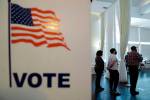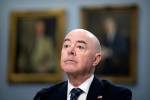Reid moves to drop flap
Sen. Harry Reid sought Monday to put out a political brush fire that threatened to engulf his re-election campaign, saying he wanted to get back to work and was done apologizing for his private description of Barack Obama as a light-skinned black man who could turn his “Negro dialect” on and off.
“I’m not going to dwell on this any more,’’ Reid said in his first public comments since his race-related remarks were leaked from a book about the 2008 White House election. “It’s in the book. I made all the statements I’m going to.”
Republican leaders weren’t ready to let the Nevada Democrat off the hook. Michael Steele, head of the Republican Party, told the Las Vegas Review-Journal he was tired of what he called a double standard that holds GOP politicians more accountable than Democrats for racial gaffes. The Republican National Committee chairman, who is black, also suggested the 70-year-old Reid is stuck in the past.
“This is 2010, not 1953,’’ Steele said in an interview in Las Vegas, where he was organizing a Republican Party fund-raiser at the M Resort. “The guy seems to be a little out of touch.”
Reid’s description of Obama as a light-skinned African-American “with no Negro dialect, unless he wanted to have one” came during a conversation in 2006 with the authors of the book “Game Change.” The book also revealed that Reid surprised Obama by calling the then-freshman Illinois senator into his office in Washington and encouraging him to run for president.
“I’m very happy about that,’’ Reid said Monday, noting he was one of the first people to suggest Obama seek the White House job. “I’ve enjoyed working with him. It’s been tremendous, terrific.”
Despite continuing GOP calls for Reid to resign, his position as Senate majority leader seemed safe for now after Obama personally accepted Reid’s apology and as black leaders across the state and the nation offered him their public and personal support.
The latest expression of forgiveness came from Attorney General Eric Holder, who said in an interview with The Associated Press that the remark was “unfortunate, but I don’t think that there is a prejudiced bone in his body.” Holder is the first black to serve as the nation’s top law enforcement official.
“I feel good about the people reaching out to me,” Reid said. “I’ve apologized to the president. I’ve apologized to everyone that’s within the sound of my voice that I could have used a better choice of words. I’ll continue to do my work for the African-American community.”
Asked by a reporter on Monday whether he planned to apologize to regular voters for implying that a dark-skinned black man might not be electable as president, Reid dismissed the question, saying he was assured by heartfelt support from national and Nevada black leaders. It was the third and last question he took on the controversy.
Reid said he was eager to get back to work, including finishing negotiations with the White House and House leaders to ensure final passage of health care insurance reform.
“We have a lot of work to do and I’ll continue to do my very best for the people of the state of Nevada and this country,” Reid said after holding a news conference at the Apex industrial complex north of Las Vegas to announce an energy project that could create several hundred jobs for Nevadans.
Still, the controversy is expected to cloud Reid’s efforts to win a fifth term in the Senate and could affect his chances to gain support of blacks and Democrats in the November election — votes he needs as early polls show him running 5-to-10 points behind his top potential GOP opponents.
“That’s problematic for Reid because he needs every Democratic voter he can get and therefore he needs a pretty strong turnout among minorities,’’ said Jennifer Duffy of the Cook Political Report. Duffy was among political analysts who believe Reid can turn the page on the topic –– although it might take longer than the senator would like –– because there’s no video or audio clips that his opponents and Republicans can use in ads and to replay over and over on TV and the Internet.
“Republicans will make hay out of this for a few days, but it will pretty much go away,” Duffy said.
Or will it? Today, several of Reid’s potential Republican opponents –– Danny Tarkanian, Sue Lowden and Sharron Angle –– are expected to attend a news conference where the so-called ''Tea Party Express’’ will announce $1 million in anti-Reid television ads to air throughout Nevada. The Tea Party movement is an anti-big government grass roots effort that includes disaffected GOP conservatives who are now trying to work closer with the Republican Party to defeat Democrats.
“Our message for Harry Reid is that your arrogance, your condescension and your failures as a senator have not gone unnoticed,” said Mark Williams, vice chairman of the Tea Party Express.
Rainier Spencer, a University of Nevada, Las Vegas, professor of anthropology and ethnic studies, said the whole Reid-race flap is politics as usual between America’s two major political parties.
“Democrats are trying to make it go away and Republicans are trying to make it stick,” Spencer said in an interview, adding that in his opinion neither side has the interests of blacks in mind.
The Reid firestorm erupted just days before Democratic strategist Donna Brazile, the black vice chairwoman of the Democratic National Committee, comes to Las Vegas on Thursday to help kick off an ''African Americans for Senator Harry Reid’’ campaign.
The White House also confirmed that Obama himself will return to Las Vegas in February after delivering his State of the Union speech.
Reid even got a sign of support from his fellow Nevada Sen. John Ensign, who has so far survived a major political scandal surrounding his confessed affair with a former staffer.
Ensign, in his first comments on the controversy, told a conservative talk show station, KOH-AM 780 in Reno, that Reid has been ensnared in media-fueled “politics of gotcha-ism.”
“I don’t know what his intentions were but I take Senator Reid at his word,” Ensign said. “I think his apology was sincere and he regretted how his comments were taken.”
“I just think we need to get away from these politics of gotcha-ism,” Ensign added. He blamed Democrats for “what they did to Trent Lott”, and “we shouldn’t do the same thing to Senator Reid.”
Lott, a Republican senator from Mississippi, resigned as Senate majority leader in 2002, 15 days after remarks he made at a 100th birthday party for Sen. Strom Thurmond, who ran for president in 1948 on a largely pro-segregation platform.
Lott said Mississippi had supported Thurmond’s candidacy, and if he had been successful, “we wouldn’t have had all these problems over the years.” In the resulting furor, Lott was criticized by senators from both parties, and then-President George W. Bush declined to throw him a lifeline.
Ensign publicly supported Lott for the two weeks the Mississippi senator was under fire. But after Lott relinquished the leadership job, Ensign said he had privately urged Lott to quit.
Review-Journal writer Benjamin Spillman and Stephens Washington Bureau Chief Steve Tetreault contributed to this report. Contact Laura Myers at lmyers@reviewjournal.com or 702-387-2919.




























